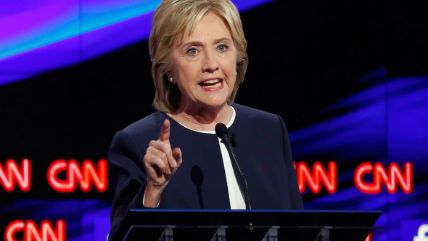Hillary Clinton's Call for Congress to Do Something About Fake News 'Epidemic' Is a Reminder of How Bad Her Presidency Would Have Been on Free Speech
'It's a danger that must be addressed and addressed quickly,' she says for the umpteenth time.

Hillary Clinton has not been seen much since the election, except up in the woods near Chappaqua in her favorite hiking sweater. Sadly, that streak ended yesterday, when she used an appearance at the retirement ceremony for Sen. Harry Reid (D-Nev.) to rail hyperbolically against "The epidemic of malicious fake news and false propaganda that flooded social media over the past year."
"It's now clear the so-called fake news can have real-world consequences," Clinton warned, referencing the gunman who arrived at Comet Pizza to investigate a nonsensical conspiracy theory. "Lives are at risk—lives of ordinary people just trying to go about their days, to do their jobs, contribute to their communities….It's imperative that leaders in both the private sector and the public sector step up to protect our democracy and innocent lives."
Watch a snippet of the alarmist sanctimony here:
This is the classic Hillary Clinton progression toward the (often unconstitutional) government restriction of speech.
Step 1: Declare something that is not remotely an epidemic is, in fact, an "epidemic." As in this hysterical speech Clinton gave in front of the Kaiser Family Foundation in March 2005:
[T]he evidence is conclusive that on balance the exposure to this much media and particularly to the violent content of it is not good for children and teenagers. And so what I'm hoping is that all we can come together. If there were an epidemic sweeping through our children of some kind of SARS of some other kind of infectious disease, we would all band together and figure out what to do to protect our children.
Well, this is a silent epidemic.

Step 2: While the headline-making incident is still fresh in everyone's minds, insist that the epidemic (which, remember, isn't remotely an epidemic) must be confronted "urgently" by both the federal government and California-based media companies. Here she was just after the December 2015 San Bernardino terrorist attack:
I know that Americans are anxious and fearful, and we have reason to be. The threat is real. The need for action is urgent….We're seeing the results of radicalization not just in far off lands, but right here at home fueled by the internet. It's the nexus of terrorism and technology, and we have a lot of work to do to end it….They are using websites, social media, chat rooms, and other platforms to celebrate beheadings, recruit future terrorists, and call for attacks. We should work with host companies to shut them down. It's time for an urgent dialogue between the government, and not just our government, government and the high tech community to confront this problem together. […]
[W]e're going to have to ask our technology companies…to help us on this. You know, the government is good in some respects, but nowhere near as good as those of you who are in this field. Right now the terrorists communicate on very ubiquitous sites: YouTube, Twitter, Facebook. The woman jihadist in San Bernardino posted her allegiance to Baghdadi and ISIS on Facebook. According to the timing we know so far, she did it either shortly before or shortly after the attack, I'm not sure which. We're going to have to have more support from our friends in the technology world to deny online space. Just as we have to destroy their would-be caliphate, we have to deny them online space. And this is complicated. You're going to hear all of the usual complaints, you know, freedom of speech, et cetera. But if we truly are in a war against terrorism and we are truly looking for ways to shut off their funding, shut off the flow of foreign fighters, then we've got to shut off their means of communicating.
If you are not familiar with the startling words in that passage above, it's probably because Donald Trump said something similarly awful about free speech and terrorism the very next day, and journalists tend to have aneurysms about Trump's First Amendment–related commentary while giving Clinton an exaggerated benefit of the doubt.
Step 3: Make a specific awful proposal, such—just spitballing here!—criminalizing the burning of American flags. Thankfully, after a long and terrible career of backing such proposals, Clinton no longer has much power in that regard.
"Fake news," by whatever definition, does not require a new legislative response from government. Americans and their political leaders have been trafficking in conspiracy from the founding to the present day. Including the conspiracy that there's a fake news epidemic in the first place.


Show Comments (110)